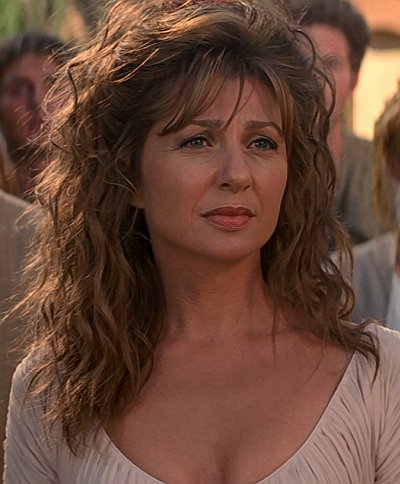Sometimes I get tired of defending this movie. In the Star Trek movies there is usually a evil humanoid looking to destroy the Enterprise or Earth. This movie doesn't do that. Outside of the choices made by Jonathan Frakes regarding F. Murray Abraham's character (he's a lot more interesting if subdued) and Will Riker playing with his joystick on the bridge of the Enterprise, this is a solid plot.
They built a culture for the first time in a long time in Trek movies. Actually, it's the first time. Having all the time in the world has allowed the Bak'u to be students for decades. This is something that could happen on earth. Rejecting technology as a means of peace is hardly a new idea, but it is done well in this movie.
The problem is that people don't listen to what is said on screen. The Bak'u are not only culture in this film. The Son'a are described as well. Makers of Ketrecel White, conquering the Tarlaq, going through regeneration procedures, etc. The Enterprise is acting in every imaginable way except being violent and savage (diplomats, explorers, defenders, etc.).
Data is in peril. We almost lose him and have to re-work his positronic brain in order to keep him functioning. Picard in the middle of this movie uses his brain and starts to sing to Data. He's trying to get through to him anyway he can. Data has more humanity to explore as well. He finds out what it is like to be a child, something he will never experience.
Picard is torn between what is right and what Federation policy is. He's not doing this for friendship the way that Kirk did for Spock, he is taking off the pips to do what is right and to stop the Federation from making a mistake. And at that point, he is sacrificing the new medicine that could develop, the changes to our society, to protect these 600 people on the planet.
The argument between Picard and the Admiral is very balanced. Each side has an argument and it's an interesting problem. Because we face this every day in foreign policy (regarding oil and our allies). We have forcefully relocated many races and it continues to be done around the world. This is something they tried (and failed) to explore with the Maquis. This is the moral conundrum--help millions by destroying 600 people, or leave the planet alone. Science research faces this problem every day. There's a lot of material, from a moral stance, explored in this film.
The relationship between the Son'a and Bak'u is interesting. Again, it's how the director treated the material that makes it seem like it's been done before.
We have big developments with characters, developed cultures, an interesting moral dilemma, and it shows Starfleet as more than madman stoppers. This is a Star Trek film where the others have failed. If that seems like something on television, it's because they've never tried it in the movie theatre before.
This isn't the best movie, but I like what it tries to do. People need to leave this one alone and just think about what we liked about Star Trek as we watch it.
good for you that you liked it, but I disagree that the movie presents an effective moral dilemma.
Stripped down to its basics, it comes down to the property rights of a tiny village vs. the medical and longevity benefits to BILLIONS.
That's not a dilemma, that's a joke. A dilemma has to be balanced.



